句子的成分、结构和基本句型
- 格式:doc
- 大小:53.00 KB
- 文档页数:4


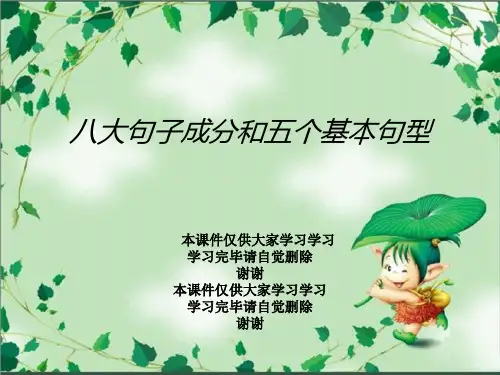
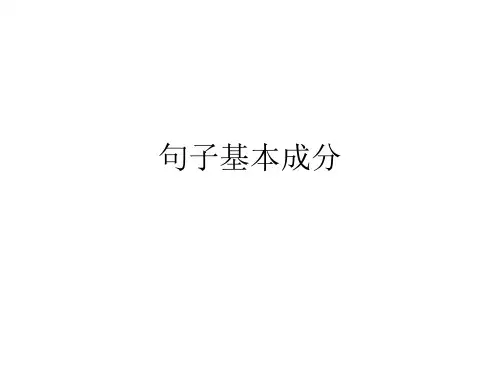
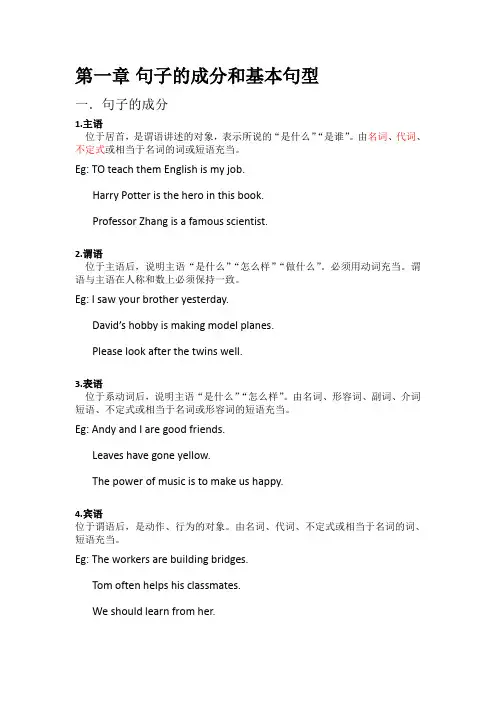
第一章句子的成分和基本句型一.句子的成分1.主语位于居首,是谓语讲述的对象,表示所说的“是什么”“是谁”。
由名词、代词、不定式或相当于名词的词或短语充当。
Eg: TO teach them English is my job.Harry Potter is the hero in this book.Professor Zhang is a famous scientist.2.谓语位于主语后,说明主语“是什么”“怎么样”“做什么”。
必须用动词充当。
谓语与主语在人称和数上必须保持一致。
Eg: I saw your brother yesterday.David’s hobby is making model planes.Please look after the twins well.3.表语位于系动词后,说明主语“是什么”“怎么样”。
由名词、形容词、副词、介词短语、不定式或相当于名词或形容词的短语充当。
Eg: Andy and I are good friends.Leaves have gone yellow.The power of music is to make us happy.4.宾语位于谓语后,是动作、行为的对象。
由名词、代词、不定式或相当于名词的词、短语充当。
Eg: The workers are building bridges.Tom often helps his classmates.We should learn from her.5.宾语补足语位于宾语后,用来补充宾语的意义。
由名词、形容词、副词、介词短语、不定式、现在分词、过去分词充当。
Eg: Please call me Tom.His blame made Marry cry.6.状语可位于句末、句首、句中,表示行为发生的时间、地点、目的、方式、程度等。
由副词、介词短语、不定式或相当于副词的词或短语充当。
Eg: Unfortunately, I missed the train.Andy did his homework carefully.7.定语位置灵活。
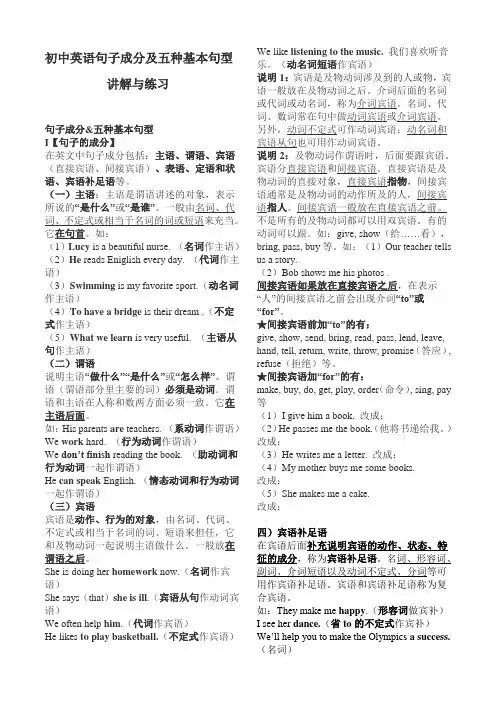
初中英语句子成分及五种基本句型讲解与练习句子成分&五种基本句型I【句子的成分】在英文中句子成分包括:主语、谓语、宾语(直接宾语、间接宾语)、表语、定语和状语、宾语补足语等。
(一)主语:主语是谓语讲述的对象,表示所说的“是什么”或“是谁”。
一般由名词、代词、不定式或相当于名词的词或短语来充当。
它在句首。
如:(1)Lucy is a beautiful nurse. (名词作主语)(2)He reads Eniglish every day. (代词作主语)(3)Swimming is my favorite sport.(动名词作主语)(4)To have a bridge is their dream .(不定式作主语)(5)What we learn is very useful. (主语从句作主语)(二)谓语说明主语“做什么”“是什么”或“怎么样”。
谓语(谓语部分里主要的词)必须是动词。
谓语和主语在人称和数两方面必须一致。
它在主语后面。
如:His parents are teachers. (系动词作谓语)We work hard. (行为动词作谓语)We don’t finish reading the book. (助动词和行为动词一起作谓语)He can speak English. (情态动词和行为动词一起作谓语)(三)宾语宾语是动作、行为的对象,由名词、代词、不定式或相当于名词的词、短语来担任,它和及物动词一起说明主语做什么。
一般放在谓语之后。
She is doing her homework now.(名词作宾语)She says(that)she is ill.(宾语从句作动词宾语)We often help him.(代词作宾语)He likes to play basketball.(不定式作宾语)We like listening to the music.我们喜欢听音乐。
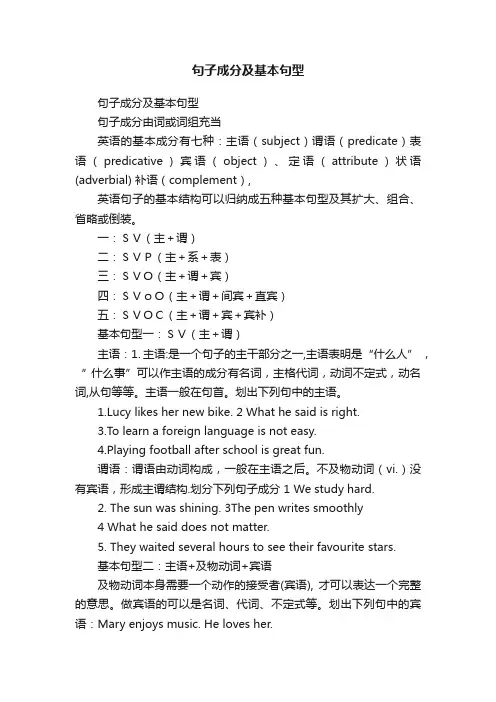
句子成分及基本句型句子成分及基本句型句子成分由词或词组充当英语的基本成分有七种:主语(subject)谓语(predicate)表语(predicative)宾语(object)、定语(attribute)状语(adverbial) 补语(complement),英语句子的基本结构可以归纳成五种基本句型及其扩大、组合、省略或倒装。
一:SV(主+谓)二:SVP(主+系+表)三:SVO(主+谓+宾)四:SVoO(主+谓+间宾+直宾)五:SVOC(主+谓+宾+宾补)基本句型一:SV(主+谓)主语:1. 主语:是一个句子的主干部分之一,主语表明是“什么人” ,“ 什么事”可以作主语的成分有名词,主格代词,动词不定式,动名词,从句等等。
主语一般在句首。
划出下列句中的主语。
1.Lucy likes her new bike. 2 What he said is right.3.To learn a foreign language is not easy.4.Playing football after school is great fun.谓语:谓语由动词构成,一般在主语之后。
不及物动词(vi.)没有宾语,形成主谓结构.划分下列句子成分 1 We study hard.2. The sun was shining. 3The pen writes smoothly4 What he said does not matter.5. They waited several hours to see their favourite stars.基本句型二:主语+及物动词+宾语及物动词本身需要一个动作的接受者(宾语), 才可以表达一个完整的意思。
做宾语的可以是名词、代词、不定式等。
划出下列句中的宾语:Mary enjoys music. He loves her.I don’t know what to do.The old man enjoys living in the countryside. 。
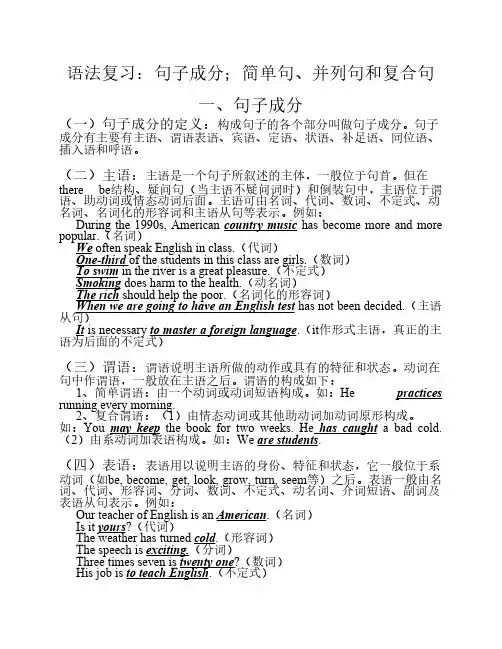
语法复习:句子成分;简单句、并列句和复合句一、句子成分(一)句子成分的定义:构成句子的各个部分叫做句子成分。
句子成分有主要有主语、谓语表语、宾语、定语、状语、补足语、同位语、插入语和呼语。
(二)主语:主语是一个句子所叙述的主体,一般位于句首。
但在there be结构、疑问句(当主语不疑问词时)和倒装句中,主语位于谓语、助动词或情态动词后面。
主语可由名词、代词、数词、不定式、动名词、名词化的形容词和主语从句等表示。
例如:During the 1990s, American country music has become more and more popular.(名词)We often speak English in class.(代词)One-third of the students in this class are girls.(数词)To swim in the river is a great pleasure.(不定式)Smoking does harm to the health.(动名词)The rich should help the poor.(名词化的形容词)When we are going to have an English test has not been decided.(主语从句)It is necessary to master a foreign language.(it作形式主语,真正的主语为后面的不定式)(三)谓语:谓语说明主语所做的动作或具有的特征和状态。
动词在句中作谓语,一般放在主语之后。
谓语的构成如下:1、简单谓语:由一个动词或动词短语构成。
如:He practices running every morning.2、复合谓语:(1)由情态动词或其他助动词加动词原形构成。
如:You may keep the book for two weeks. He has caught a bad cold.(2)由系动词加表语构成。
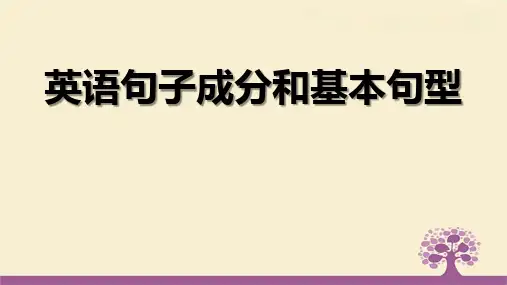
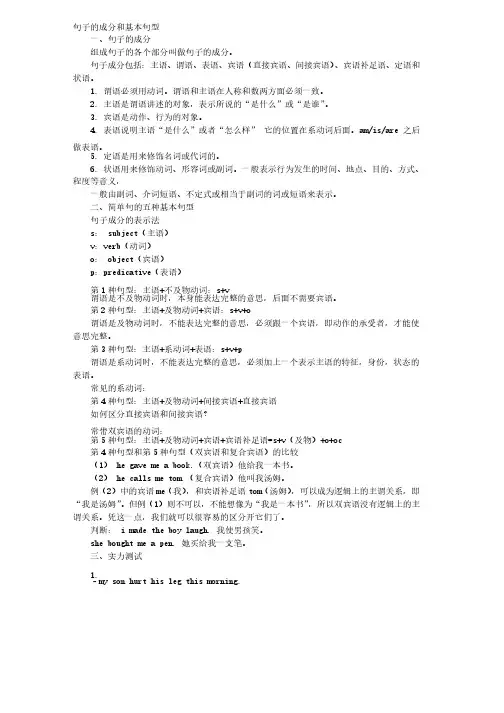
句子的成分和基本句型一、句子的成分组成句子的各个部分叫做句子的成分。
句子成分包括:主语、谓语、表语、宾语(直接宾语、间接宾语)、宾语补足语、定语和状语。
1. 1. 谓语必须用动词。
谓语和主语在人称和数两方面必须一致。
谓语必须用动词。
谓语和主语在人称和数两方面必须一致。
2. 2. 主语是谓语讲述的对象,表示所说的“是什么”或“是谁”主语是谓语讲述的对象,表示所说的“是什么”或“是谁”。
3. 3. 宾语是动作、行为的对象。
宾语是动作、行为的对象。
4. 4. 表语说明主语“是什么”或者“怎么样”表语说明主语“是什么”或者“怎么样”它的位置在系动词后面。
它的位置在系动词后面。
am/is/are am/is/are 之后做表语。
5. 5. 定语是用来修饰名词或代词的。
定语是用来修饰名词或代词的。
6. 6. 状语用来修饰动词、形容词或副词。
一般表示行为发生的时间、地点、目的、方式、状语用来修饰动词、形容词或副词。
一般表示行为发生的时间、地点、目的、方式、程度等意义,一般由副词、介词短语、不定式或相当于副词的词或短语来表示。
二、简单句的五种基本句型句子成分的表示法s s:: subject subject(主语)(主语)v v::verb verb(动词)(动词)o o:: object object(宾语)(宾语)p p::predicative predicative(表语)(表语)第1种句型:主语种句型:主语++不及物动词:不及物动词:s+v s+v 谓语是不及物动词时,本身能表达完整的意思,后面不需要宾语。
第2种句型:主语种句型:主语++及物动词及物动词++宾语:宾语:s+v+o s+v+o谓语是及物动词时,不能表达完整的意思,必须跟一个宾语,即动作的承受者,才能使意思完整。
第3种句型:主语种句型:主语++系动词系动词++表语:表语:s+v+p s+v+p谓语是系动词时,不能表达完整的意思,必须加上一个表示主语的特征,身份,状态的表语。
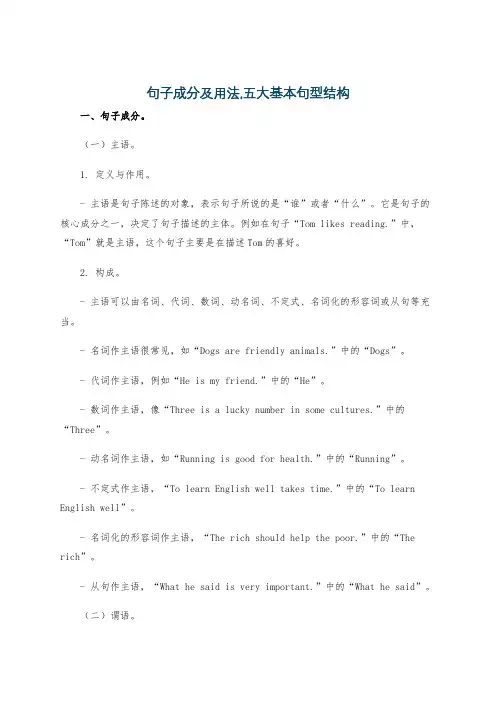
句子成分及用法,五大基本句型结构一、句子成分。
(一)主语。
1. 定义与作用。
- 主语是句子陈述的对象,表示句子所说的是“谁”或者“什么”。
它是句子的核心成分之一,决定了句子描述的主体。
例如在句子“Tom likes reading.”中,“Tom”就是主语,这个句子主要是在描述Tom的喜好。
2. 构成。
- 主语可以由名词、代词、数词、动名词、不定式、名词化的形容词或从句等充当。
- 名词作主语很常见,如“Dogs are friendly animals.”中的“Dogs”。
- 代词作主语,例如“He is my friend.”中的“He”。
- 数词作主语,像“Three is a lucky number in some cultures.”中的“Three”。
- 动名词作主语,如“Running is good for health.”中的“Running”。
- 不定式作主语,“To learn English well takes time.”中的“To learn English well”。
- 名词化的形容词作主语,“The rich should help the poor.”中的“The rich”。
- 从句作主语,“What he said is very important.”中的“What he said”。
(二)谓语。
1. 定义与作用。
- 谓语是对主语动作或状态的陈述或说明,指出“做什么”“是什么”或者“怎么样”。
在句子中,谓语动词的形式要与主语的人称和数保持一致。
例如在“Mary sings beautifully.”中,“sings”就是谓语,它描述了Mary的动作。
2. 构成。
- 谓语一般由动词充当,包括实义动词、系动词、助动词和情态动词等。
- 实义动词可以独立作谓语,表示具体的动作,如“eat”“drink”“run”等。
例如“He eats an apple.”中的“eats”。
句子结构句子成分五种基本句型
句子结构指的是句子的整体形式或组织方式。
句子结构通常由主语、谓语和宾语组成,有时还会包括其他的修饰语或补语。
句子成分是指在句子中起不同作用的词语或词组。
常见的句子成分有主语、谓语、宾语、表语、状语、定语和补语等。
五种基本句型是指英语中常见的五种基本句子结构:
1. 主+谓:例如,“I study.”
2. 主+谓+宾:例如,“She loves him.”
3. 主+谓+宾+宾语补足语:例如,“They made him the president.”
4. 主+谓+表:例如,“He is a teacher.”
5. 主+谓+宾+宾语补足语+表:例如,“They elected her president.”
这些基本句型可以根据需要添加各种修饰语和状语,以表达更加复杂的意思。
句子成分和基本句型、句式概念:句子是由词按照一定的语法结构组成的。
组成句子的各个部分包括:主语、谓语、表语、宾语、宾语补足语、定语和状语。
句子依其各成分的组合方式可分为五种句型。
一、句子成分1.主语主语是谓语讲述的对象,表示所说的“是什么”或“是谁”。
一般由名词、代词、不定式或相当于名词的词或短语来充当。
它位于句首。
We study in No.1 Middle School.(讲述“谁”……)我们在一中学习。
The classroom is very clean.(讲述“什么”…)这间教室很干净。
2.谓语谓语说明“做什么”“是什么”或“怎么样”,谓语(谓语部分里主要的词)必须用动词。
谓语和主语在人称和数两方面必须一致,它在主语后面。
His parents are doctors.他的父母是医生。
She looks well.她看起来气色很好。
They are studying English.3.表语表语说明主语“是什么”或者“怎么样”,由名词、形容词、副词、介词、不定式及相当于名词或形容词的词或短语来担任。
它的位置在系动词后面。
You look younger than before(形容词作表语) 你看起来比以前年轻。
I am a teacher.(名词作表语) 我是个老师。
4. 宾语宾语是动词、行为的对象,由名词、代词、不定式或相当于名词的词、短语来担任,它和及物动词一起说明主语做什么,在谓语之后;有些动词需要接双宾语,即:直接宾语和间接宾语。
They are having a meeting.His father bought him a gift.He wants to go to the movie tonight.5. 宾语补足语在英语中有些句子里只有宾语并不能表达完整的意思,还必须在宾语后面加上宾语补足语才能表达完整的意思。
名词、形容词、介词短语、不定式、现在分词、过去分词都可以作宾语补足语。
英语句子成分分析句子是按照一定的语法规律组成的,表达一个完整的意义。
一个句子一般由两部分构成,即主语部分和谓语部分,这两部分也叫做句子的主要成分。
句子的次要成分包括宾语,定语,状语,表语等。
句子成分是句子中起一定功用的组成部分.1)主语:是一句的主体,是全句述说的对象,常用名词,数词或代词担任,一般放于句首.如:Students study. (学生学习)We are friends.(我们是朋友)这两句话中单词students是个名词,we是代词,它们在句中做主语。
2)谓语:是对主语加以陈述,表示主语的行为或状态,常用动词或者动词词组担任,放在主语的后面。
如:Students study. (学生学习.)We are friends。
(我们是朋友)这两句话中单词study和are都是动词,study叫做实意动词,are叫做be动词,它们在句中作谓语。
3)宾语:表示行为的对象,常由名词或者代词担任。
放在及物动词或者介词之后。
如:They are teachers。
( 他们是老师。
)I play with him. (我和他一起玩。
)这两句话中单词teachers是名词,单词him是带词,它们在句中作宾语。
4)定语:是用来说明或者限制名词的成分,常用形容词或者相当于形容词的短语或从句担任。
形容词放在名词之前,相当于形容词的短语或从句放在名词的后面。
如:This is a red sun。
(这是个红太阳。
)He is a tall boy。
(他是个高个子男孩。
)这两句话中单词red和 tall都是形容词,它们作定语。
5)状语是用来说明动词,形容词,副词或整个句子的成分.常由副词担任.修饰动词时可以放在动词之前,也可以放在动词之后;修饰形容词或副词时放在它们之前。
如:The students study hard。
(这些学生学习努力。
)I often write to him. (我常给他写信.)The bag is too heavy。
汉语句子的成分和基本句型句子的组成部分包括主语、谓语、宾语、定语、状语、补语六种。
句型:按结构划分:单句和复句,其中单句包括主谓句、动词谓语句。
复句包括并列关系、承接关系、选择关系、总分关系、转折关系、递进关系。
按作用划分:陈述句、祈使句、感叹句、疑问句。
句子的组成部分主语:1、定义:主语:主语是句子中的陈述对象,说明是谁或什么。
2、特点:A、经常由名词、代词、名词性短语充当。
B、一般表示谓语所说的是“谁”或“什么”。
3、符号:双行线═。
谓语:1、定义:用来说明陈述主语。
2、特点:A、经常由动词、形容词充当。
B、一般表示主语“怎么样”或“是什么”。
3、符号:单行线_____。
宾语:1、定义:表示谓语动词的涉及对象的语言单位。
2、特点:A、经常由名词、代词、名词性短语充当。
B、一般表示谓语“怎么样”或“是什么”。
3、符号:波浪线﹏﹏。
4、凡能愿动词,如“希望、想、可以、说”等词后面的一般都作宾语处理。
定语:1、定义:用在主语和宾语前面,起修饰和限制作用的语言单位。
2、特点:A、经常由名词、形容词、动词、代词充当。
B、一般定语与中心词之间有“的”字连接。
3、符号:小括号()。
状语:1、定义:用在动词、形容词谓语前,起修饰和限制作用的语言单位。
2、特点:A、经常由副词、形容词、动词、表示处所和时间的名词和方位词充当。
B、一般状语与中心词之间有“地”字连接。
3、符号:中括号〔〕。
补语:1、定义:谓语后面的附加成分,对谓语起补充说明作用,回答“怎么样”、“多久”、“多少”(时间、处所、结果)之类问题的语言单位。
2、特点:A、经常由动词、形容词副词充当。
B、一般补语与中心词之间有“得”字连接。
3、符号:单书名号〈〉。
句子的成分和基本句型句子是由各种词类按照一定的语法规则组成的,可以表达完整的概念。
句子开头第一个字母一定要大写,结尾要注明标点符号。
一、句子的成分组成句子的各个部分叫作句子的成分。
句子的成分有主语、谓语、表语、宾语(直接宾语和间接宾语)、宾语补足语、定语和状语。
其中主语和谓语是句子的主体,表语、宾语和宾语补足语是谓语的组成部分,其他成分如定语和状语是句子的次要部分。
1 主语主语是整个句子的话题,它指明该句讲的是什么,通常用名词、代词、不定式或相当于名词的词、短语或从句担任。
主语要放在句首。
The girl studies in No.4 Middle School. (叙述“谁”,名词作主语)The post office is open. (叙述“事,什么”,名词作主语) Only five are here. (数词作主语)To say is one thing, and to do is another. (不定式作主语)What you said hurt me badly. (从句作主语)Seeing is believing. (动名词做主语)注意:过去式或过去分词不能做主语注意:it作主语时,可以有以下作用:①表示时间、天气、季节、距离和自然现象。
It's twelve thirty. It's windy today.。
②表示刚刚提到的事情。
What's this? It's a fox. What's that? It's your new coat.③起指示代词的作用,表示人或事物。
Who is it outside? It's Susan.④用作形式主语或形式宾语。
Do you find it difficult to work out the problem?What's it like being a pilot? It's my job to teach them English2 谓语谓语是相对主语而言,它在句中是对主语加以说明的部分起着说明主语的动作、特征或状态的作用,必须用动词表示。
句子的成分、结构和基本句型句子是写作的基本单位,只有写好句子才有可能写好文章。
英语的句子成分有八种:主语、谓语动词、表语、宾语、定语、状语、主语补足语和宾语补足语。
一.英语的句子成分:(一)主语:Walls have ears. ( )He will take you to the hospital. ()To see is to believe. ()Smoking is not allowed in public places. ()Whether or not they will come depends on the weather. ()(二)谓语动词由_____________担任。
助动词或情态动词加其他动词的适当形式也构成谓语动词。
Action speaks louder than words.The chance may never come again.Mary has been working at the dress shop since 1994. (三)表语它的位置在__________之后。
My father is a professor. ( )Who's that? It's me. ( )Everything here is expensive. ( )The match became very exciting.( )The story of my life may be of help to others.( )Three times five is fifteen. ( )His plan is to seek work in the city. ( )My first idea was that you should hide your feelings. ( ) (四)宾语表示动作的对象,是动作的承受者。
宾语一般放在___________之后。
_____词后也会跟宾语。
She covered her face with her hands.( )We haven't seen her for a long time. ( )Do you mind opening the window? ( )Give me four please. ( )He wants to dream a nice dream. ( )We need to know what others are doing. ( )We should care more about our friends. ( )(五)定语是修饰___词.单词作定语时通常放在它所修饰的名词之_____;短语和从句作定语时则放在它所修饰的名词之_____。
The play has three acts. ( )This is her first trip to Europe. ( )They are women workers. ()Tom's father didn't write home until yesterday. ()Mary is a beautiful girl.. ()China is a developing country. ( )I have nothing to eat. ( )Those who want to go to Tibet are to sign their names here. ( )(六)状语状语表示地点、时间、原因、目的、结果、条件、伴随情况等。
The best fish swim near the bottom. ( )I left the village five years ago. ( )I arrived late because of the traffic jam .( )We'll send a car to fetch you. ( )The fish can eat a person in two minutes , leaving only bones.( )The students came into the classroom, singing and dancing.( )If he goes, so will I . ( )Though he is a child, he knows a lot. ( )(七)宾语补足语英语有些及物动词,除了要有宾语之外,还要加上宾语补足语,才能使句子的意义完整。
宾语和宾语补足语一起构成___________。
They elected me captain of the team. ( )We try to make our country strong. ( )We found everything in good order there. ( )I should advise you to get the chance. ( )I saw him going upstairs. ( )(八)主语补足语如果上述结构变成被动语态,原宾语成为主语,原宾语补足语相应地变为主语补足语I was elected captain of the team.Our country will be made strong.二、简单句的五种基本句型只含一个主谓结构的句子(有时有并列主语或并列谓语动词)叫做简单句。
1. 主语+ 不及物动词( S + V )The time passed quickly.2. 主语+ 及物动词+ 宾语( S + V +O )We have planted a lot of trees in our hometown.3. 主语+ 系动词+ 表语( S + V + C )Computers are useful in people’s life.4. 主语+ 及物动词+ 间接宾语+ 直接宾语( S + V + IO + DO )He bought me a birthday present.5. 主语+ 及物动词+ 宾语+ 宾语补足语( S + V + O + C )Miss Wang told me not to be discouraged.6. There be 句型There was an old man sitting there.英语的基本句型练习1.主语+ 系动词+ 表语1)Our city is at the crossing of some important railways.2)The city will become rich.在这类结构中最常用的系动词是:“变化”类:become, get, grow, turn, go等“感官”类: feel, smell, taste, sound, look, appear, seem 等“持续”类:remain, keep, hold, stay, rest等2.主语+ 谓语1)Building has started.2)The train leaves at 7:40.3.主语+ 谓语+ 宾语1)The boss employed five more workers.2)My brother takes care of the vegetable garden.3)Few students like taking exams4)He forgot to close the door.5)I hope I can speak English fluently._4.主语+ 谓语+ 间接宾语+ 直接宾语1)He has fetched us some new textbooks.2)Grandma cooked us a nice meal.3)The man told the girl that he wants to test her the subject.4)The boy asked me if I could speak Chinese.可接双宾语的常见动词有:ask, answer, give, offer, send, bring, pass, tell, show, teach, promise5.主语+ 谓语+ 宾语+ 宾语补足语1)The villagers didn’t allow them to do this.2)I will keep the box in the shade.3)We found him a very good pupil.4)She let me stay in the company.5)We kept the room clean.6)We heard the girl singing the song. 7)He got his hair cut short.二、句子的基本分类1、按使用目的,句子可分为陈述句、疑问句、祈使句和感叹句。
1)陈述句:说明一个事实或陈述一种看法。
例如:Light travels faster than sound. 光比声传播速度快。
(说明事实)The film is rather boring. 这部电影很乏味。
(说明看法)2)疑问句:提出问题。
有以下四种:a. 一般疑问句:Can you finish the work in time?b. 特殊疑问句:Where do you live?c. 选择疑问句:Do you want tea or coffee?d. 反意疑问句:He doesn't know her, does he?3)祈使句:提出请求,建议或发出命令。
例如:Don't be nervous!4)感叹句:表示说话人惊奇、喜悦、愤怒等情绪。
例如:What good news it is!2、按其结构,句子可以分为以下三类:1)简单句:只包含一个主谓结构句子叫简单句。
例如:①1. Things changed.②Trees are green.③. We don’t like children.2)并列句:包含两个或两个以上主谓结构的句子叫并列句,句与句之间通常用并列连词或分号来连接。
例如:The food was good, but he had little appetite.3)复合句:包含一个主句和一个或几个从句的句子叫复合句,从句由从属连词引导。
例如:The film had begun when we got to the cinema.英语音标发音表英语国际音标共48个音素,其中元音音素20个,辅音音素28个。